中国特有词汇英译
- 格式:doc
- 大小:38.00 KB
- 文档页数:10
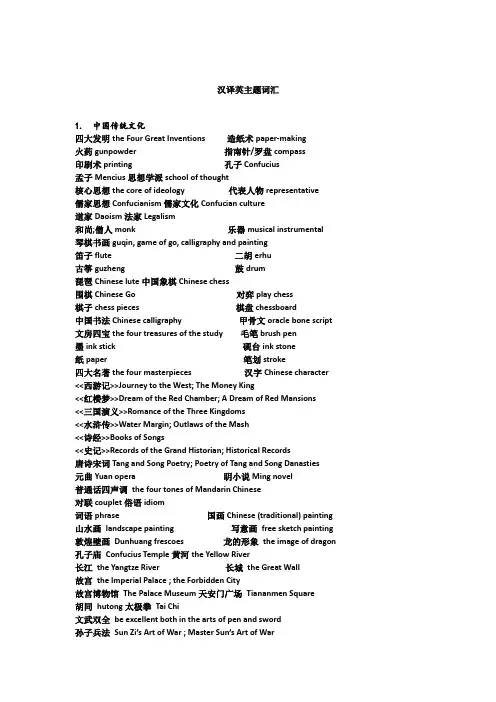
汉译英主题词汇1.中国传统文化四大发明the Four Great Inventions 造纸术paper-making火药gunpowder 指南针/罗盘compass印刷术printing 孔子Confucius孟子Mencius思想学派school of thought核心思想the core of ideology 代表人物representative儒家思想Confucianism儒家文化Confucian culture道家Daoism法家Legalism和尚;僧人monk 乐器musical instrumental琴棋书画guqin, game of go, calligraphy and painting笛子flute 二胡erhu古筝guzheng 鼓drum琵琶Chinese lute中国象棋Chinese chess围棋Chinese Go 对弈play chess棋子chess pieces 棋盘chessboard中国书法Chinese calligraphy 甲骨文oracle bone script 文房四宝the four treasures of the study 毛笔brush pen墨ink stick 砚台ink stone纸paper 笔划stroke四大名著the four masterpieces 汉字Chinese character <<西游记>>Journey to the West; The Money King<<红楼梦>>Dream of the Red Chamber; A Dream of Red Mansions<<三国演义>>Romance of the Three Kingdoms<<水浒传>>Water Margin; Outlaws of the Mash<<诗经>>Books of Songs<<史记>>Records of the Grand Historian; Historical Records唐诗宋词Tang and Song Poetry; Poetry of Tang and Song Danasties元曲Yuan opera 眀小说Ming novel普通话四声调the four tones of Mandarin Chinese对联couplet俗语idiom词语phrase 国画Chinese (traditional) painting 山水画landscape painting 写意画free sketch painting 敦煌壁画Dunhuang frescoes 龙的形象the image of dragon 孔子庙Confucius Temple黄河the Yellow River长江the Yangtze River 长城the Great Wall故宫the Imperial Palace ; the Forbidden City故宫博物馆The Palace Museum天安门广场Tiananmen Square胡同hutong太极拳Tai Chi文武双全be excellent both in the arts of pen and sword孙子兵法Sun Zi’s Art of War ; Master Sun’s Art of War科举制imperial examination system状元the top scholar; champion 武术Chinese martial arts 古代兵器ancient weapon盔甲suit of armor 剑sword古玩antique算盘abacus三百六十行all walks of life ; all kinds of jobs铁饭碗iron bowl 礼节etiquette尊老爱幼respect the old and love the young礼物馈赠present-giving 民间禁忌folk taboos丧葬funeral孝服mourning clothes纸钱ghost money 十二生肖Chinese Zodiac 鼠Rat牛Ox鸡Rooster梅花plum blossoms竹子bamboo松pine牡丹peony莲花lotus莲藕lotus root 中山装Chinese tunic suit 中国传统服饰tradition Chinese costume 唐装the Tang suit民间故事folk tale 寓言fable传说legend凡间human world重要文化遗产major cultural heritage 国宝national treasure 文物cultural relics 高雅艺术high/refined art 才子佳人gifted scholars and beautiful ladies享有…….的声誉enjoy a good/high reputation for被誉为be honored/crowned as 增进友谊enhance friendship 推广中国文化promote Chinese culture文化底蕴cultural deposit 文化事业cultural undertaking 文化冲击cultural shock 蓬勃发展flourish文化特性和价值观national identity and value在各地差异很大vary widely from region/place to region/place促进文化的传播promote the spread of culture丰富多彩be rich and colorful 传统美德traditional virtues尊敬老人respect the elderly 赡养父母support/take care of parents 象征意义symbolic meaning审美观/品味taste for beauty ; aesthetic taste2.中国传统节日春节the Spring Festival 除夕Chinese New Year’s Eve 年夜饭the dinner on New Year’s Eve 小年minor Spring Festival 春运Spring Festival travel seasons; Chunyun period买年货do Spring Festival shopping ; buy necessity for Spring Festival 扫尘土sweep the dust 剪窗花do paper-cutting 贴春联stick couplets 挂灯笼hang lanterns祭祖offer sacrifices to one’s ancestors 祭祀sacrifices烟花爆竹fireworks and firecrackers 财神the god of wealth压岁钱gift money; lucky money包饺子make dumplings拜年New Year’s visit 阳历solar calendar天干heavenly stem 地支earthly branch闰年leap year 亲朋好友relatives and friends 探亲访友pay a visit to relatives and friends大扫除thoroughly clean the house驱厄运sweep away ill fortune; get rid of bad luck去除灾难ward off evils 年画New Year Picture 发红包give money in red envelopes; hand out red envelopes欢度……the celebration of……; celebrate……. 年糕rice cake转运have a chance of luck 春卷spring rolls春节联欢晚会Spring Festival Gala 祝福短信blessing message 元宵节the Lantern Festival 元宵sweet dumplings扭秧歌do the Yangko Dance 舞龙dragon dance舞狮lion dance 灯谜lantern riddles龙抬头Dragon Heads-raising Day 祈雨pray for rain丰收good harvest 清明节Tomb Sweeping Day 雨水rainwater春耕the Spring ploughing扫墓attend/sweep tomb; clean the grave祭品sacrifices; sacrifice offerings 踏青have an outgoing in Spring 端午节Dragon Boats Festival 粽子Zongzi; glutinous rice pudding 赛龙舟dragon boats racing 雄黄酒realgar wine七夕Double Seventh Festival 梳妆dress and make up牛郎Cowherd织女Weaver Maid喜鹊桥the magpie bridge 中元节/鬼节Ghost Festival河灯water lantern 中秋节Mid-autumn Festival团圆饭family reunion dinner 花灯colorful lantern月圆夜full moon 赏月enjoy the moon吃月饼have moon cake 思想be homesick重阳节Double Ninth Festival重阳糕double ninth cake赏菊enjoy chrysanthemums 菊花酒chrysanthemum wine 寒食节Cold Food Festival 冷食cold food禁烟smoking ban; not allow to make fire 斗鸡cockfight蹴鞠kickball; cuju 荡秋千play on a swing拔河push-and-pull; tug of war 腊八节the Laba Festival腊八粥Laba rice porridge 腊八面Laba noodle3.中国饮食文化中国菜Chinese cuisine; Chinese food 粤菜Canton cuisine炒stir-fry 煎fry炸deep-fry烩/焖/炖stew蒸steam烘焙bake切条cut to strips 切丁dice切碎mince磨碎grind特色食品specialty红茶black tea绿茶green tea 火锅hotpot熊掌bear paw 豆浆soybean milk馒头steamed buns 花卷steamed twisted rolls 包子steamed suffered buns; Baozi 北京烤鸭Beijing Roast Duck4.中国传统手工艺传统工艺品traditional handicraft 绣花鞋embroidered shoes优秀民间艺术品outgoing folk arts 中国瓷器Chinese ceramics 唐三彩Tricolor-glazed Pottery of the Tang Dynasty彩陶painted pottery 材质各异various materials 陶器pottery; earthenware 质地坚硬hard texture青铜器bronze ware 造型生动vivid figure雕刻carving色彩丰富rich color玉雕jade carving 风格独特characteristic/unique style 蜡染wax printing 中国织绣Chinese silk embroideries 泥人clay figure 中国结Chinese knot刺绣embroidery绣球embroidered ball5.中国表演艺术脸谱facial makeup 正面角色positive role说学逗唱speaking, imitating, teasing and singing木偶戏puppet show 说书story-telling皮影戏shadow play 杂技acrobatics客家山歌Hakka hill song 历史人物historical figure四大文明古国之一one of the four ancient civilizations人类文明史the history of human civilization中国古代史ancient Chinese History中国近现代史modern history of China历史遗留问题a question left over from history/the past源远流长/历史悠久with/have a long history繁荣盛世a time of prosperity 古都ancient capital华夏之祖ancestors of Chinese nation发祥地birthplace封建朝代feudal dynasty远古时代ancient times兴起于……, 兴盛于……..emerge in……and prosper in…..原始社会primitive society 战国the Warring States春秋时期the Spring and Autumn Period封建社会feudal society 印/玺seal/stamp皇妃imperial concubine 太后empress dowager诸侯Prince/duck under an emperor 宰相prime minister士大夫scholar-officials 太监eunuch侍卫bodyguard将军general6.旅游交通旅游景点tourist scenes 避暑胜地summer resort森林公园forest park 人文景观human landscape 自然景观natural scenery 建筑architecture壮丽河山magnificent scenery 皇家园林royal garden古典山水园林classical landscape garden钟楼bell tower 鼓楼drum tower牌坊memorial archway 兵马俑Terracotta Warriors 天坛the Temple of Heaven 保存最完好的best-preserved 原址original site 国家博物馆national museum 中外游客tourist from home and aboard7.地理环境幅员辽阔have a vast territory 省会provincial capital水域面积water area 高原plateau三面环山be surrounded by mountains on three side8.医疗健康诊断diagnosis(n); diagnose(v) 偏方folk prescription祖传秘方secret prescription handed down from one’s ancestors中医Traditional Chinese Medicine(TCM)救死扶伤heal the sick and rescue the dying望闻问切observing, listening, inquiring, pulse-taking肥胖症obesity草药herbal therapy食疗food therapy 延缓衰老slow down aging。
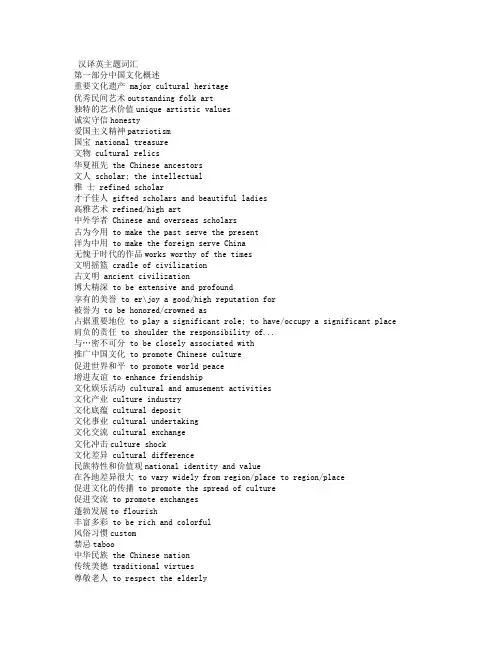
汉译英主题词汇第一部分中国文化概述重要文化遗产 major cultural heritage优秀民间艺术outstanding folk art独特的艺术价值unique artistic values诚实守信honesty爱国主义精神patriotism国宝 national treasure文物 cultural relics华夏祖先 the Chinese ancestors文人 scholar; the intellectual雅士 refined scholar才子佳人 gifted scholars and beautiful ladies高雅艺术 refined/high art中外学者 Chinese and overseas scholars古为今用 to make the past serve the present洋为中用 to make the foreign serve China无愧于时代的作品works worthy of the times文明摇篮 cradle of civilization古文明 ancient civilization博大精深 to be extensive and profound享有的美誉 to er\joy a good/high reputation for被誉为 to be honored/crowned as占据重要地位 to play a significant role; to have/occupy a significant place 肩负的责任 to shoulder the responsibility of...与…密不可分 to be closely associated with推广中国文化 to promote Chinese culture促进世界和平 to promote world peace增进友谊 to enhance friendship文化娱乐活动 cultural and amusement activities文化产业 culture industry文化底蕴 cultural deposit文化事业 cultural undertaking文化交流 cultural exchange文化冲击culture shock文化差异 cultural difference民族特性和价值观national identity and value在各地差异很大 to vary widely from region/place to region/place促进文化的传播 to promote the spread of culture促进交流 to promote exchanges蓬勃发展to flourish丰富多彩 to be rich and colorful风俗习惯custom禁忌taboo中华民族 the Chinese nation传统美德 traditional virtues尊敬老人 to respect the elderly赡养父母 to support/take care of parents继承 to inherit后人 later generation强身健体 to improve the physical health; to strengthen the body 益寿延年 to prolong life 保佑平安 to keep sb. safe象征意义 symbolic meaning象征好运和祝福 to symbolize good luck and blessings审美观/品味 taste for beauty; aesthetic taste第二部分传统文化传统工艺品 traditional handicraft形状不一 different shapes材质各异 various materials质地坚硬hard texture造型生动vivid figure色彩丰富rich colors风格独特 characteristic/unique style中医 traditional Chinese medicine中草药 herbal medicine望、闻、问、切 observing,listening, inquiring, pulse taking症状 symptom 针灸 acupuncture推拿 medical massage重大发明 a significant invention中国古代四大发明the Four Great Inventions of ancient China火药 gunpowder印刷术printing .造纸术 paper-making指南针compass文房四宝 the Four Treasures of the Study笔、墨、纸、砚 ink brush, inkstick, Xuan paper, inkstone汉字 Chinese character笔划stroke四书五经 the Four Books and the Five Classics唐诗宋词 poetry in the Tang and Song Dynasties诗人poet四大名著 the Four Great Classical Novels八股文 the eight-part essay普通话四声调 the four tones of Mandarin Chinese琴棋书画 lute-playing, chess, calligraphy andpainting书法 calligraphy中国画 traditional Chinese painting水墨画 Chinese brush painting; ink wash painting民俗 folk custom文化遗产 cultural heritage非物质文化遗产 intangible cultural heritage吉祥/幸运数字lucky number偶数/双数even number奇数/单数odd number吉祥物mascot龙 dragon凤 phoenix龟 tortoise吉祥图案lucky pattern姓氏文化 surname culture婚嫁习俗 marriage custom传统婚礼 traditional wedding葬礼习俗 funeral custom迷信/迷信的 superstition/superstitious 武术 martial arts中国功夫 Chinese Kung Fu太极Tai Chi中国象棋Chinese chess中国围棋Go麻将 mal\jong宗教 religion伊斯兰教Islam清真寺mosque寺庙temple和尚/僧人monk民间故事folk tale寓言fable传说legend凡间 human world思想学派 school of thought思想观念ideology哲学家 philosopher思想家thinker创始人founder代表人物 representative儒家思想Confucianism儒家文化 Confucian culture道教Taoism佛教 Buddhism孔子 Confucius孟子 Mencius老子 Lao Tzu; Lao Zi庄子 Chuang Tzu墨子Mo Tzu孙子Sun Tzu《论语》The Analects of Confucius 《道德经》Tao Te Ching《易经》The Book of Changes《孙子兵法》The Art of War第三部分传统节曰春节 the Spring Festival/Chinese New Year元宵节 the Lantern Festival清明节 the Tomb-sweeping Day/Qing Ming Festival端午节 the Dragon Boat Festival中秋节 the Mid-autumn Day/Festival重阳节 the Double Ninth Day七夕节 the Double Seventh Day/Qixi Festival除夕 Chinese New Year’s Eve公历/ 阳历 solar calendar农历/阴历 lunar calendar庆祝(节日)celebrate; observe起源origin 春联 spring couplets起源于 to originate in/from爆竹 firecrackers; fireworks习俗 tradition; convention; custom年画 New Year pictures年夜饭 annual reunion dinner庙会 temple fair拜年 to pay a New Year call民间艺人folk artist探亲访友 to (pay a) visit (to) relatives and祭神 god-worshiping friends舞龙 dragon dance亲朋好友 relatives and friends灯笼/花灯(festival) lantern大扫除 to thoroughly clean the house灯谜 lantern riddle驱厄运 to sweep away ill fortune; to get rid of有益的智力活动 beneficial intellectual ;bad luck中国结 Chinese knot去除灾难 to ward off evils赛龙舟 dragon boat race压岁钱luck money赏月 to enjoy the full moon发红包 to give money in red envelopes; to hand out red envelopes 登高 hill climbing放风筝to fly a kite欢度to celebrate...; the celebration of...荡秋千 to play/ride on a swing第四部分民间艺术中国传统戏曲 Chinese traditional operas手艺 craftsmanship京剧 Peking Opera工匠/手工艺人craftsman京剧脸谱 the facial makeup of Beijing Opera/剪纸 Chinese paper cuttingPeking Opera Mask刺绣 embroidery正面角色positive role丝绸silk说、学、逗、唱 speaking, imitating, teasing and singing 纺织品textile瓷器 porcelain; chinaware传统乐器 traditional instrument陶器 pottery; earthenware木偶戏 puppet show青铜器 bronze ware皮影戏 shadow play中国结 Chinese knot杂技 acrobatics泥塑 day figure modeling相声 crosstalk中国玉器Chinese jade说书 story-telling雕刻 carving民间工艺folk craft第五部分中餐及烹饪方法中国菜/中餐 Chinese cuisine; Chinese food絵/焖/炖to stew八大菜系 Eight Cuisines蒸 to steam粤菜 Canton cuisine煮 to boil国宴 state banquet烘焙to bake色香味 outlook, flavor and taste烤 to roast香脆可口 crispy and tasty切条 to cut to strips营养丰富nutritious切丁 to dice烹饪技巧 cooking technique切碎 to mince煎 to fry磨碎to grind炒 to stir-fry饮食习惯dietary habit炸 to deep-fry特色食品 special food; specialty元宵 sweet sticky rice dumplings年糕 rice cake油条 deep-fried dough sticks豆浆 soybean milk馒头 steamed bun包子 steamed stuffed bun拉面 hand-stretched noodles豆腐 tofu; bean curd麻花 fried dough twist皮蛋 100-year egg; century egg蛋炒饭 fried rice with egg火锅hot pot原材 ingredient调料 seasoning; dressing猪/牛肉丸 pork/beef ball 鸭肉duck蘑燕 mushroom北京烤鸭 Beijing Roast Duck素菜馆 vegetarian restaurant白酒 Chinese liquor第六部分中国历史四大文明古国之一 one of the four ancient civilizations中华文明 Chinese civilization文明的摇篮 cradle of civilization文明古国 ancient civilization人类文明史 the history of human civilization远古时代ancient times原始社会 primitive society封建社会 feudal society源远流长/历史悠久 to have a long history; with a long history 随着时间的推移as time goes by朝代 dynasty春秋战国时期 the Spring and Autumn and Warring States Period 古都ancient capital皇帝 /君主 emperor; monarch勤政爱民 to be diligent and love one’s people退位 to give up the throne丞相 /宰相 prime minister学者 scholar政治家statesman军事家 military strategist鸦片战争the Opium War南昌起义 Nanchang Uprising集体经济 collective economy计划经济 planned economy自由经济 liberal economy商品经济 commodity economy经济体制改革 reform of the economic system辛亥革命 the 1911 Revolution五四运动 the May Fourth Movement抗日战争 the Anti Japanese War西安事变 Xi’an Incident南京大屠杀 Nai\jing Massacre长征 the Long March历史遗留问题 a question left over from history/ the past在战争中损毁to be ruined in wars抵抗侵略 to resist the invasion在世纪初 at the beginning of... century迄今为止up till now追溯到 to date back to; to be traced back to...来源于 to derive/stem from; to originate from/in发祥地 birthplace兴起于,兴盛于to emerge in... and prosper in...社会地位social status建立(朝代)to build; to found; to establish繁荣 to prosper/flourish灭亡 to collapse; to come to an end以命名 to be named after...历史人物 historic figure闰年 leap year经济特区 special economic zone人均国民收人 national income per capita第一产业/农业 primary industry; agriculture第二产业/工业 secondary industry; manufacturing第三产业/服务业 tertiary industry; service?农业 farming林业 forestry畜牧业 animal husbandry副业 sideline production渔业 fishing经济增长率 economic growth rate财政政策fiscal policy经济结构调整 adjustment of economic structure优化经济结构 to optimize the economic structure改善经济环境 to improve economic environment科学技术是第一生产力science and technology are the primary productive forces 国有资产 state-owned property开放国内市场to open domestic缩小贫富差距to narrow the rich and poor消除贫困 to eliminate poverty共同富裕 common prosperity经济形势 economic situation经济波动 economic fluctuation经济衰退 economic depression; recession经济稳定 economic stability经济政策 economic policy经济复原 economic recovery经济奇迹 economic miracle经济起飞 economic take-off全球经济 global economy经济学家economist企业家 entrepreneur经济全球化 economic globalization市场经济 market economy市场调节 market regulation市场多元化 market diversification推动经贸合作 to boost economic and trade cooperation 商界 business communities互惠互利 mutual benefit总需求 aggregate/total demand总供给 aggregate supply扩大内需 to expand domestic demand团购 group buying财政预算 financial budget耐用消费品durable consumer年末促销 year-end promotion垄断 monopoly垄断行业 monopoly industry市场占有率market share生产力/生产率productivity经济增长放缓economic slowdown国有企业 state-owned enterprise (SOE)私营企业 private business合资企业joint venture民营企业 privately-run business中小企业 small and medium-sized enterprise小微企业 small and micro-sized firm民间资本 private capital民间投资 private investment泡沫经济 bubble economy经济过热 overheating of economy实体经济 the real economy外汇储备充足 sufficient foreign exchange reserve国内/国际贸易 domestic/international trade对外贸易foreign trade贸易条件terms of trade不公平竞争 unfair competition海关 customs关税 customs duty水货/走私货smuggled goods产品质量 product quality高度评价 to speak highly of物美价廉 competitive price and superior quality 销量/销售额sales存货/库存量stocks金融组织 financial institution商业信誉 commercial reputation管理机制 management mechanism改善服务 to improve services延长保修期 to extend maintenance制造商/制造厂manufacturer原材料 raw material样品sample大规模生产mass production年产量 annual output劳动力密集型产业labour-intensive industry知识密集型产业 knowledge-intensive industry工作歧视 discrimination in workplace高消耗 high consumption高投人 high investment沿袭模式 to continue with the model of...住房抵押贷款 residential mort age loan分期付款 to pay by installments信贷紧缩 credit squeeze?利率 interest rate找工作 to hunt for a job; job-hunting招聘广告the want ads职位 position; post; job vacancy/opening求职信 application letter个人简历r6sum6; CV填写申请表 to fill in/out application form接受职位 to accept/take the post接任职位 to take over the position工作面试job interview职业前景 job/career prospects就业机会 job opportunity工资待遇pay offer津贴 allowance带薪假 paid vacation伤残保险 disability insurance失业保险 unemployment insurance培训咨询 training consultancy专业技能 professional expertise脑力劳动mental work体力劳动 labour/physical work手工劳动 manual labour/work工作时间working time加班 work overtime; overtime夜班 night shift零工odd job证券 securities资产assets利润profit供需平衡 balance between supply and demand供求关系 supply and demand relation供过于求 supply exceeds demand通货紧缩deflation通货膨胀inflation基本建设/基础设施infrastructure生活标准/生活水平living standard购买力 purchasing power; buying power短缺 shortage不发达的 underdeveloped发展中的developing持续、快速和健康的经济发展sustained, rapid and sound economic development 四大国有银行 the four major state-owned banks支票 cheque/check转账/过户to transfer存钱 to deposit money取钱 to withdraw money货币 money; currency发行issue现金cash零钱change钞票/纸币 banknote; note; bill汇率/兑换率exchange rate利息 interest保险 insurance抵押 mortgage税制 taxation system征税/纳税taxation个人所得税 individual income tax免税的tax-free纳税人taxpayer股票市场 stock exchange股份/股票share; stock股息/红利dividend房地产 real estate经济适用房 economically affordable house 廉租房 low-rent house第八部分旅游地理地理 geography华东 East China华南 South China西部地区western region中西部地区 central and western regions; midwest 地形/地势terrain海拔/高度elevation大陆 continent平原plain半岛 peninsula山谷/峡谷 valley; canyon海峡 channel; strait黄河 the Yellow River长江 the Yangtze River五岳 the Five Mountains泰山 Mount Tai西湖 West lake丝绸之路the Silk Road文化古迹 cultural relics建筑 architecture长城 the Great Wall故宫 the Imperial Palace; the Forbidden City天坛 the Temple of Heaven国家博物馆national museum钟楼 bell tower鼓楼 drum tower胡同Hutong大运河 Grand Canal苏州园林 Suzhou gardens景点 tourist attraction; scenic spot名胜古迹 places of interests避暑胜地summer resort森林公园forest park自然保护区nature reserve自然景观 natural scenery壮丽河山 magnificent scenery淡水湖 freshwater lake古典山水园林 classical landscape garden皇家园林royal garden中外游客 tourists from home and abroad游乐园 amusement park气候 climate环境保护 environmental protection环境问题 environmental problem/issue环境污染 environmental pollution污染物pollutant全球变暖 global warming温室效应 greenhouse effect废水 waste water; polluted water废气 polluted gas; exhaust gas白色污染 white pollution雾霾天气smog weather植物园 botanical garden度假 to take a vacation; to go on holiday门票(entrance) ticket星级酒店 star-rated hotel保存最完好的best-preserved原址 original site高峰期rush hour人山人海/人满为患 overcrowded; to be packed with overcrowded people翻山越岭 to climb mountains and hills受到的热烈欢迎to be warmly welcomed by…位于 to be located in/at 省会 provincial capital水域面积water area三面环山 to be surrounded by mountains on three sides全长公里 to stretch for... km/kilometers面貌焕然一新 to take on a completely new look丰富知识 to enrich one’s knowledge开阔视野 to broaden one’s horizons扩大知识面 to enlarge the scope of knowledge培养独立性 to cultivate independence运输工具 means of transportation公共交通 public transport地铁站 subway station候车室 waiting room护照 passport签证有效期validity of visa散客 individual visitor团体游客group visitor环境灾害沙尘天气 sand and dust weather提高全民环保意识 to raise environmental awareness amongst the general public节能减排energy-saving and emission-reduction; energy conservation and emission reduction预防为主、防治结合policy of prevention in the first place and integrating prevention with control环保产品 environment-friendly product一次性产品 disposable product开发可再生资源 to develop renewable resources?高會巨耗产业 energy-intensive industry生态环境 the ecological environment水土流失 water loss and soil erosion水土保持 water and soil conservation降雨量rainfall物种灭绝 the extinction of bio-species先污染后治理 to exert control after pollution碳减排 carbon emission reduction温室气体 greenhouse gas emission二氧化碳 carbon dioxide新能源汽车green car汽车尾气 motor vehicle exhaust发动机排量 engine displacement零排放车辆 zero-emission vehicle小排量汽车 small-displacement car资源枯竭 depletion of resources能源危机energy crisis原油 crude oil油价飙升 oil prices surge可替代能源 alternative energy清洁能源clean energy新型能源 new type energy回收利用to recycle垃圾分类 garbage classification可回收的recyclable不可回收的unrecyclable处理 to dispose低碳城市化道路 way of low-carbon urbanization城市化 urbanization濒临灭绝/失传 to be on the verge of extinction/ loss 珍稀淑危物种 rare and endangered species稀有物种rare species防护林带shelter belt森林覆盖率 forest coverage rate改善土壤 soil improvement地质灾害 geological disaster灾难 catastrophe; tragedy; disaster不幸 misfortune伤亡人员casualty死亡人数death toll台风 typhoon火山爆发 volcanic eruption地震 earthquake洪水flood干旱 drought第十部分教育普及教育 universal education素质教育 quality education; quality-oriented education 应试教育 examination-oriented education九年义务教育 nine-year compulsory education学前教育 preschool education初等教育 elementary education小学 elementary school; primary school初中 junior high school高中 senior high school希望工程Project Hope学龄儿童school-ager失学儿童dropout课业负担 academic burden学生减负 alleviate the burden on students入学率 enrollment rate适龄儿童人学率 enrollment rate for children of school age高考 university/college entrance examination高等教育 higher education高等学府 institution of higher education综合性大学 comprehensive university文科院校 college of (liberal) arts理工科大学 college/university of science and engineering师范学院 normal college军校 military academy大学城 college town象牙塔 ivory tower校园文化 campus culture高校扩招 the college expansion助学贷款 student loan; educational loan受过良好教育的well-educated大学生 undergraduate研究生 graduate student; postgraduate (student)应届毕业生 graduating student; current year’s graduate考研 to take the entrance exams for postgraduate schools读研 to attend graduate school?毕业典礼 graduation ceremony 毕业论文 a graduation paper 毕业实习 graduation field work; to go out on internships授予学位 to confer an academic degree on sb.博士学位 doctor’s degree硕士学位 masters degree学士学位 bachelor’s degree在职博士生 on-job doctorate就业难 tough employment缓解就业压力 to alleviate employment pressure中专生 students of secondary vocational school扩大招生人数 to enlarge school enrollment/ recruits升学率 proportion of students entering schools of a higher grade高分低能 high scores and low abilities填鸭式教学 cramming method of teaching培训班 training class去读生 extern; non-resident student住校生boarder课外活动 extracurricular activity必修课 required/compulsory course选修课 elective/optional course基础课 basic course专业课 specialized course专业知识 specialized knowledge开设课程 to offer a course课程表 school schedule教学大纲 teaching program; syllabus学分制 credit system补考 make-up examination学年 school year师资力量 teaching faculty推进素质教育 to push ahead with education for all-around development基本实现教育现代化to basically modernize education招生就业指导 enrollment and vocation guidance竞争激烈 fierce competition评价体系 evaluation system选拔官员/人才 to select officials/talents出国留学 to study abroad海外留学生 overseas student; international student文盲 illiteracy; illiterate继续教育 continuing/further education终身学习 life-long learning自学考试 self-study examination夜间大学 evening university电视大学 open university成人夜校 night school for adults在职进修班 on-job training courses远程学习 distance learning充电 to update one’s knowledge教育界 education circle教育投入 input in education教育公平 fairness/equality in education教育资源 education resource教师资源 teacher resource分配不均衡 unevenly distributed/allocated教学设施 teaching facility缩小城乡教育差距to bridge/narrow the educational gap between rural and urban areas 辍学率 dropout rate第十一部分科技科技发展 scientific and technological advancement/development新兴学科 emerging discipline生物技术 bio-technology克隆 cloning基因工程 genetic engineering空间实验室space laboratory航天飞机shuttle卫星 satellite探测器detector信息时代 information age信息爆炸 information explosion高科技产品 high-tech product电子设备 electronic device智能手机 smartphone; intelligent handset创新 innovation研发 research and development核心技术 core technology电讯 telecommunication硬件 hardware?软件 software网络世界cyber world网络文化cyber culture网络犯罪cyber crime信息革命 information revolution电子货币e-currency人工智能 artificial intelligence (AI)虚拟银行virtual bank电子商务 e-business; e-commerce网络出版e-publishing个人信息泄露 leakage of personal information 搜索引擎search engine网页浏览web browsing即时消息 instant message视频电话video phone文件传输 document transmission在线社区 online community社交模式 social networking网上冲浪 to surf on the Internet网民 netizen活跃用户active user对上瘾 to be/get addicted to…计算机病毒computer virus虚拟世界virtual world网上购物 online shopping消费理念 consumption concept大众媒体mass media出版商publisher电子版 electronic version娱乐资讯 entertainment information三维电影 three-dimensional movie在线娱乐 online entertainment当地新闻local news简讯 brief news获取信息 to obtain information收视率 audience rating垃圾信息spam message骚扰电话 harassing call第十三部分政策法规基本国策 a basic national/state policy制定政策 to make a policy(政策)生效/开始实施 to come into force/effect晚婚晚育 late marriage and late childbirth搞好优生优育 to promote good prenatal and postnatal care稳定低生育水平 to stabilize the low birth rate推行可持续发展战略to pursue the strategy of sustainable development 简化审批程序 to simplify approval procedures行政管理 administrative management违反规定 to violate a rule/regulation少数民族 ethnic minority过快增长 excessive growth急剧下降 to be on the sharp decline人口稠密/稀少 densely/sparsely populated人口基数/密度/分布 population base/density/distribution人口出生率birth rate人口增长的高峰期baby boom人口素质 quality of the population人口老龄化 aging of population人口流动 population mobility老龄化社会aging society城镇化 urbanization高楼大厦 high-rise/tall/high building小康社会 well-off society贫困家庭poor family和睦相处 to live in peace/harmony中国特色社会主义 socialism with Chinese characteristics物质文明 material civilization精神文明 spiritual civilization为人民服务 to serve the people坚持的方针 to adhere to the principle of...社会保障 social security养老保险 retirement insurance医疗保险 medical insurance弱势群体 disadvantaged group单亲 single parent关心老龄人 to care for senior citizens大龄青年 older adults; single youth above the normal matrimonial age 独生子女 the only child in a family社会背景 social background福利 welfare福利彩票 welfare lotteries家政服务 household management service?医疗服务 medical service满足基本需求 to satisfy basic needs社会效益 social benefit健康管理 health management应运而生 to appear accordingly; to emerge as required/needed 普通市民 ordinary resident物价上涨rising price家政服务业 home services industry建筑工地 construction site农产品 agricultural product爱情告白 to express one’s love几世同堂的家庭 a family consisting of several generations性骚扰 sexual harassment贫富分化 disparity between the rich and the poor挂失 to report the loss补办 to re-apply/re-register/post-register户籍 household registration居住证 residence permit基础设施建设 infrastructure construction劳动力短缺labor shortage空巢老人empty nester农民工 migrant worker农村剩余劳动力 surplus rural labor/laborers机动车辆猛增motor vehicles surge交通堵塞 traffic jam/congestion过度拥挤overcrowded单双号限行 even-odd license plate plan闯红灯 running red light扣分处罚point penalty酒驾 drunk driving终身禁驾 lifetime ban from driving性别歧视 gender/sexual discrimination年龄歧视 age discrimination盗版 pirated; illegal copies法制观念 awareness of law法制国家 a country with an adequate legal system改革开放 reform and opening-up可持续发展 sustainable development和谐并存 harmonious coexistence计划生育 family planning计划生育基本国策 the basic state policy of family planning科教兴国 national rejuvenation through science and education 公务员 civil servants官僚主义作风 the bureaucratic style of work廉洁高效 honesty and high efficiency居委会 neighborhood committee一国两制 One Country, Two Systems一个中国原则 the one-China principle两岸关系 cross-straits relations两岸谈判 cross-straits negotiations领土完整 territorial integrity民族精神 national spirit求同存异 to seek common ground while shelving differences 精神文明建设 the construction of spiritual civilization 与时倶进 to keep pace with the times综合国力 overall national strength共同愿望common desire“走出去”(战略)going global全民健身运动 nationwide fitness campaign人口普查census社会保险 social insurance。
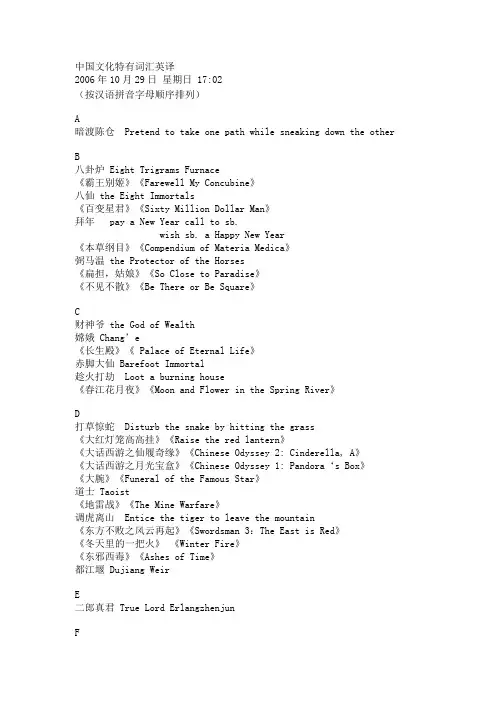
中国文化特有词汇英译2006年10月29日星期日 17:02(按汉语拼音字母顺序排列)A暗渡陈仓Pretend to take one path while sneaking down the otherB八卦炉 Eight Trigrams Furnace《霸王别姬》《Farewell My Concubine》八仙 the Eight Immortals《百变星君》《Sixty Million Dollar Man》拜年 pay a New Year call to sb.wish sb. a Happy New Year《本草纲目》《Compendium of Materia Medica》弼马温 the Protector of the Horses《扁担,姑娘》《So Close to Paradise》《不见不散》《Be There or Be Square》C财神爷 the God of Wealth嫦娥Chang’e《长生殿》《 Palace of Eternal Life》赤脚大仙 Barefoot Immortal趁火打劫Loot a burning house《春江花月夜》《Moon and Flower in the Spring River》D打草惊蛇Disturb the snake by hitting the grass《大红灯笼高高挂》《Raise the red lantern》《大话西游之仙履奇缘》《Chinese Odyssey 2: Cinderella, A》《大话西游之月光宝盒》《Chinese Odyssey 1: Pandora‘s Box》《大腕》《Funeral of the Famous Star》道士 Taoist《地雷战》《The Mine Warfare》调虎离山Entice the tiger to leave the mountain《东方不败之风云再起》《Swordsman 3:The East is Red》《冬天里的一把火》《Winter Fire》《东邪西毒》《Ashes of Time》都江堰 Dujiang WeirE二郎真君 True Lord ErlangzhenjunF反间计 Sow discord among the enemyUse double agent反客为主Make the guest and host change places《封神榜》《Granting Titles to Gods》凤阳花鼓 Flower Drum Dance《佛经》 Buddhist scripturesG隔岸观火Watch a fire burning from the other side of the river 《故事新编》(鲁迅作品集)《Old Tales Retold 》《刮痧》《Treatment》关门捉贼Shut the door to catch the thief观音菩萨 Avalokitesvara《贵妃醉酒》《The drunk concubine》《Drunken Concubine》《国产007》《From Beijing with Love》H河伯 River Uncle《红高粱》《Red sorghum》《红楼梦》《A Dream in Red Mansions (Chamber)》《The Story of the Stone》釜底抽薪Take away the firewood under the cooking pot花果山 Mountain of Flowers and Fruits《花样年华》《In the Mood for Love》《黄飞鸿》《Once Upon a Time in China》《荒山泪》《Tears of Huangshan 》《回家过年》《Seventeen Years》混水摸鱼Fish in troubled water《霍元甲》《Fearless》J假痴不癫Play dumb, remain smart《甲方乙方》《Dream Factory》假途伐虢Obtain safe passage to conquer the enemy《将相和》《General and Premier Make Up 》借刀杀人Kill someone with a borrowed knife《借东风》《East Wind》借尸还魂Borrow another's body to return the soul金蝉脱壳Get away like the cicada sloughing its skin金箍棒 golden cudgel《警世通言》 Ordinary Words to Warn the World《九一神雕侠侣》《Savior of the Soul》巨灵神 Mighty Miracle GodK空城计 Present a bold front to conceal unpreparedness苦肉计 Inflict injury upon oneself to gain trustL雷公 the Thunder God李代桃僵Sacrifice the plum for the peach连环计Chain together the enemy's ships《梁祝》(小提琴协奏曲)《Butterfly Love》《聊斋志异》《Strange Tales of a Lonely Studio》《Strange Tales from a Scholar’s Studio》《烈火金刚》《Steel Meets Fire》《林家铺子》《The Shop of Lin Family》灵霄宝殿 Hall of Miraculous Mist《刘三姐》《Third Sister Liu》龙王 Dragon King《龙须沟》《Longxu Ditch》《鹿鼎记》《Royal Tramp》《论语》《Analects of Confucius》罗汉 arhat炉火神 the Fire GodM瞒天过海Cross the sea under camouflage美猴王 Handsome Monkey King美人计 The beauty trapUse seductive women to corrupt the enemy《没事偷着乐》《Steal Happiness》门神 Door Gods《末代皇帝》《The last emperor》《牡丹亭》 Peony PavilionN哪吒三太子 Prince Ne ZhaP《拍案惊奇》《Surprise Stories to Make One Slap the Desk 》蟠桃园 the Immortality Peach Garden《炮打双灯》《Red Firecracker, Green Firecracker》抛砖引玉Bait a piece of jade with a brick《琵琶记》《The Story of Pipa》《漂亮妈妈》《Breaking the Silence》菩萨 BoddhisattvaQ七十二般变化 seventy-two different forms齐天大圣 the Great Sage Equalling Heaven《乔家大院》《The grand courtyard of Qiao Family》《秦颂》《Emperor‘s Shadow》《情癫大圣》《A Chinese Tale Story》《清明上河图》《Riverside Scene at Qingming Festival》擒贼擒王To catch the bandit ,first capture their leader《秋菊打官司》《The story of QiuJu》《群英会》《Gathering of Heroes》R《人鬼情》《Woman-Demon-Human》《儒林外史》《The Scholars》S《三国演义》《The Romance of the Three Kingdoms》《the three kingdoms' story》“三言”“二拍” Three Volumes of Words, Two Volumes of Slapping 《山海经》《the Classic of Mountains and Rivers》上屋抽梯Pull down the ladder after ascent声东击西Clamour in the east, attack in the west《生死抉择》《Fatal Decision》《十面埋伏》《The house of flying daggers》《十面埋伏》(古曲)《Ambush from All Sides 》四大天王 Four Heavenly Kings《瘦虎肥龙》《Skinny Tiger and Fatty Dragon》树上开花Deck the tree with bogus blossom《水浒传》《Heroes of the Marshes》《Water Margins》《All Men Are Brothers: Blood of the Leopard》水帘洞 Water Curtain Cave顺手牵羊Take the opportunity to pilfer a goat孙悟空的师父 Patriarch SubhutT太白金星 Great White Planet《太极张三丰》《Twin Warriors》太上老君 Lord Lao Zi of the Great Monad《唐伯虎点秋香》《Flirting Scholar》《桃花扇》《 The Peach Blossom Fan》《天仙配》《Goddess Marriage》铁拐李 Iron Crutch Li偷梁换柱Replace the beams with rotten timbers土地神 Local God of the Land托塔李天王 Heavenly King with a Pagoda in HandW王母娘娘 the Queen Mother of the West《围城》《A Surrounded City》围魏救赵Relieve the state of Zhao by besieging the state of Wei 《我的父亲母亲》《The Road Home》《无极》《The Promise》《无间道》《Infernal Affairs》《五女拜寿》《Celebrating Mother’s Birthday 》五行山 Five Elements Mountain无中生有Create something out of nothingX《西厢记》《The Romance of West Chamber》《西游记》《Pilgrimage to the West》《Journey to the West》《monkey goes west》《record of a journey to the west》《憩园》(巴金作品集)《Garden of Respose》笑里藏刀Knife hidden under the smiling face《醒世恒言》 Lasting Words to Awaken the WorldY炎黄子孙 Chinese descent阎王爷 King of Hell样板戏 model opera《阳光灿烂的日子》《In the Heat of the Sun》《杨门女将》《Women General of Yang Family》瑶池 Jade Pool药王 the King of Medicine《一个好人》《Mr. Nice Guy》以逸待劳Wait for the exhausted enemy at one's ease《英雄本色》《A Better Tomorrow》《Color of a Hero 》《有话好好说》《Keep Cool》玉皇大帝 the Jade Emperor欲擒故纵To catch something, first let it go《喻世明言》《Clear Words to Illustrate the World 》远交近攻Befriend a distant state while attacking a neighborZ《早熟》《2 young》灶王爷 the Kitchen God指桑骂槐Revile the locust tree while pointing at the mulberry 《中华英雄》《A Man Called Hero》《资治通鉴》《History as a Mirror》走为上计Run away to fight another dayEscape is the best policy。
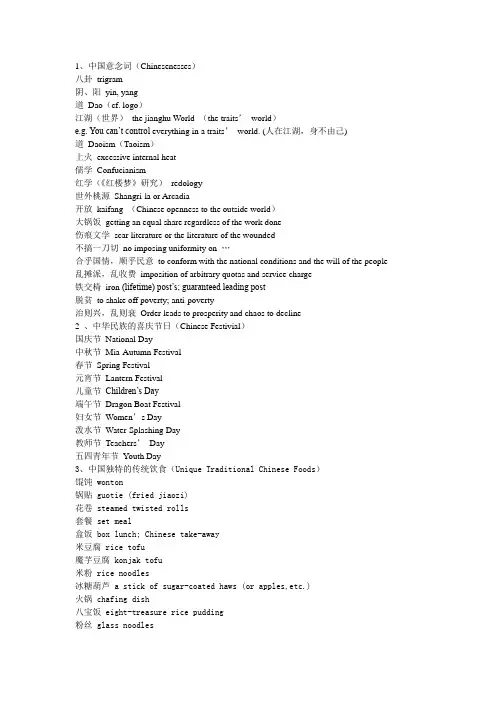
1、中国意念词(Chinesenesses)八卦trigram阴、阳yin, yang道Dao(cf. logo)江湖(世界)the jianghu World (the traits’world)e.g. You can’t control everything in a traits’world. (人在江湖,身不由己)道Daoism(Taoism)上火excessive internal heat儒学Confucianism红学(《红楼梦》研究)redology世外桃源Shangri-la or Arcadia开放kaifang (Chinese openness to the outside world)大锅饭getting an equal share regardless of the work done伤痕文学scar literature or the literature of the wounded不搞一刀切no imposing uniformity on …合乎国情,顺乎民意to conform with the national conditions and the will of the people 乱摊派,乱收费imposition of arbitrary quotas and service charge铁交椅iron (lifetime) post’s; guaranteed leading post脱贫to shake off poverty; anti-poverty治则兴,乱则衰Order leads to prosperity and chaos to decline2 、中华民族的喜庆节日(Chinese Festivial)国庆节National Day中秋节Mia-Autumn Festival春节Spring Festival元宵节Lantern Festival儿童节Children’s Day端午节Dragon Boat Festival妇女节Women’s Day泼水节Water-Splashing Day教师节Teachers’Day五四青年节Youth Day3、中国独特的传统饮食(Unique Traditional Chinese Foods)馄饨 wonton锅贴 guotie (fried jiaozi)花卷 steamed twisted rolls套餐 set meal盒饭 box lunch; Chinese take-away米豆腐 rice tofu魔芋豆腐 konjak tofu米粉 rice noodles冰糖葫芦 a stick of sugar-coated haws (or apples,etc.)火锅 chafing dish八宝饭 eight-treasure rice pudding粉丝 glass noodles豆腐脑 jellied bean curd4 、中国新兴事物(Newly Sprouted Things)中国电信 China Telecom中国移动 China Mobile十五计划 the 10th Five-Year Plan中国电脑联网 Chinanet三峡工程 the Three Gorges Project希望工程 Project Hope京九铁路 Beijing CKowloon Railway扶贫工程 Anti-Poverty Project菜篮子工程 Vegetable Basket Project温饱工程 Decent-Life Project安居工程 Economy Housing Project扫黄 Porn-Purging Campaign西部大开发 Go-West Campaign5 、特有的一些汉语词汇禅宗 Zen Buddhism禅 dhyana; dhgaya混沌 chaos道 Daosim, the way and its power四谛 Four Noble Truth八正道 Eightfold Path无常 anity五行说 Theory of Five Elements无我 anatman坐禅 metta or transcendental meditation空 sunyata虚无 nothingness双喜 double happiness(中),a doubled stroke of luck(英) 小品 witty skits相声 cross-talk噱头;掉包袱 gimmick, stunt夜猫子 night people; night-owls本命年 this animal year of sb.处世之道 philosophy of life姻缘 yinyuan(prefixed fate of marriage)还愿 redeem a wish (vows)6 、具有文化特色的现代表述大陆中国 Mainland China红宝书 little red book红色中国 socialist China四化 Four Modernizations终生职业 job-for-life铁饭碗 iron rice bowl大锅饭 communal pot关系户 closely-related units外出打工人员 migrant workers关系网 personal nets, closely-knitted guild五讲(讲文明、讲礼貌、讲卫生、讲秩序、讲道德):the Five Merits focus on decorum, manners, hygiene, disciplines and morals四美(心灵美、语言美、行为美、环境美): the Four Virtues are golden heart, refined language, civilized behavior, and green environment7 、中国古代独特事物(Unique Ancient Chinese Items)宣纸 rice paper衙门 yamen叩头 kowtow孔子Confucius牌楼 pailou;pai-loo武术 wushu(Chinese Martial Arts)功夫 kungfu ;kung fu中庸 the way of medium (cf. Golden Means)中和 harmony (zhonghe)孝顺 to show filial obedience孝子 dutiful son家长 family head三纲:君为臣纲,父为子纲,夫为妻纲 three cardinal guides: ruler guides subject, father guides son husband guides wife五常:仁、义、理、智、信 five constant virtues: benevolence (humanity), righteousness, propriety, wisdom and fidelity八股文 eight-legged essays多子多福:The more sons/children, the more blessing/ great happiness养儿防老:raising sons to support one in one’s old age8、近一季度见诸报端的中国现代特色词汇翻译基层监督 grass-roots supervision基础税率 base tariff level婚介所 matrimonial agency婚外恋 extramarital love婚纱摄影 bride photo黑心棉 shoddy cotton机器阅卷 machine scoring即开型奖券 scratch-open ticket/lottery集中精力把经济建设搞上去 go all out for economic development价格听证会 public price hearings甲A球队 Division A Soccer Team家政服务 household management service加强舆论监督 ensure the correct orientation is maintained in public opinion假帐 accounting fraud叫板 challenge; pick a quarrel矫情 use lame arguments渐进式台独 gradual Taiwan independence借调 temporarily transfer扩大中等收入者比重 Raise the proportion of the middle-income group.扩大内需,刺激消费expand domestic demand and consumption馄饨 wonton锅贴 guotie (fried jiaozi)花卷 steamed twisted rolls套餐 set meal盒饭 box lunch米豆腐 rice tofu魔芋豆腐 konjak tofu米粉 rice noodles冰糖葫芦 a stick of sugar-coated haws (or apples,etc.)火锅 chafing dish八宝饭 eight-treasure rice pudding粉丝 glass noodles豆腐脑 jellied bean curd中国新兴事物(Newly Sprouted Things)中国电信 China Telecom中国移动 China Mobile十五计划 the 10th Five-Year Plan中国电脑联网 Chinanet三峡工程 the Three Gorges Project希望工程 Project Hope京九铁路 Beijing –Kowloon Railway扶贫工程 Anti-Poverty Project菜篮子工程 Vegetable Basket Project温饱工程 Decent-Life Project安居工程 Economy Housing Project扫黄 Porn-Purging Campaign西部大开发 Go-West Campaign具有文化特色的现代表述大陆中国 Mainland China红宝书 little red book红色中国 socialist China四化 Four Modernizations终生职业 job-for-life铁饭碗 iron rice bowl大锅饭 communal pot关系户 closely-related units外出打工人员 migrant workers关系网 personal nets, closely-knitted guild五讲(讲文明、讲礼貌、讲卫生、讲秩序、讲道德):the Five Merits focus on decorum,manners, hygiene,disciplines and morals四美(心灵美、语言美、行为美、环境美): the Four Virtues are golden heart, refined language, civilized behavior, and green environment近一季度见诸报端的中国现代特色词汇翻译基层监督 grass-roots supervision基础税率 base tariff level婚介所 matrimonial agency婚外恋 extramarital love婚纱摄影 bride photo黑心棉 shoddy cotton机器阅卷 machine scoring即开型奖券 scratch-open ticket/lottery集中精力把经济建设搞上去 go all out for economic development价格听证会 public price hearings甲A球队 Division A Soccer Team家政服务 household management service加强舆论监督 ensure the correct orientation is maintained in public opinion 假帐 accounting fraud叫板 challenge; pick a quarrel矫情 use lame arguments渐进式台独 gradual Taiwan independence借调 temporarily transfer扩大中等收入者比重 Raise the proportion of the middle-income group.扩大内需,刺激消费expand domestic demand and consumption安居工程 housing project for low-income urban residents信息化 in&#102;ormation-based&#59; in&#102;ormationization智力密集型 concentration of brain power&#59; knowledge-intensive外资企业 overseas-funded enterprises下岗职工 laid-off workers分流 reposition of redundant personnel三角债 chain debts素质教育 education for all-round development豆腐渣工程 jerry-built projects社会治安情况 law-and-order situation民族国家 nation state“台独” "independence of Taiwan"台湾当局 Taiwan authorities台湾同胞 Taiwan coMPAtriots台湾是中国领土不可分割的一部分。
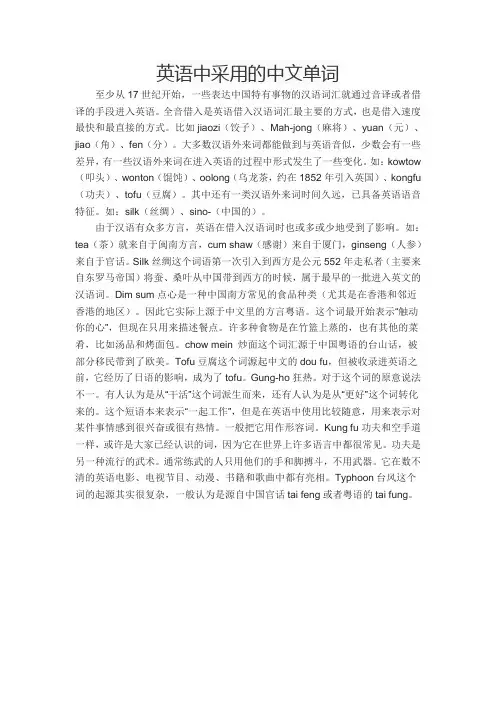
英语中采用的中文单词至少从17世纪开始,一些表达中国特有事物的汉语词汇就通过音译或者借译的手段进入英语。
全音借入是英语借入汉语词汇最主要的方式,也是借入速度最快和最直接的方式。
比如jiaozi(饺子)、Mah-jong(麻将)、yuan(元)、jiao(角)、fen(分)。
大多数汉语外来词都能做到与英语音似,少数会有一些差异,有一些汉语外来词在进入英语的过程中形式发生了一些变化。
如:kowtow (叩头)、wonton(馄饨)、oolong(乌龙茶,约在1852年引入英国)、kongfu (功夫)、tofu(豆腐)。
其中还有一类汉语外来词时间久远,已具备英语语音特征。
如:silk(丝绸)、sino-(中国的)。
由于汉语有众多方言,英语在借入汉语词时也或多或少地受到了影响。
如:tea(茶)就来自于闽南方言,cum shaw(感谢)来自于厦门,ginseng(人参)来自于官话。
Silk丝绸这个词语第一次引入到西方是公元552年走私者(主要来自东罗马帝国)将蚕、桑叶从中国带到西方的时候,属于最早的一批进入英文的汉语词。
Dim sum点心是一种中国南方常见的食品种类(尤其是在香港和邻近香港的地区)。
因此它实际上源于中文里的方言粤语。
这个词最开始表示“触动你的心”,但现在只用来描述餐点。
许多种食物是在竹篮上蒸的,也有其他的菜肴,比如汤品和烤面包。
chow mein 炒面这个词汇源于中国粤语的台山话,被部分移民带到了欧美。
Tofu豆腐这个词源起中文的dou fu,但被收录进英语之前,它经历了日语的影响,成为了tofu。
Gung-ho狂热。
对于这个词的原意说法不一。
有人认为是从“干活”这个词派生而来,还有人认为是从“更好”这个词转化来的。
这个短语本来表示“一起工作”,但是在英语中使用比较随意,用来表示对某件事情感到很兴奋或很有热情。
一般把它用作形容词。
Kung fu功夫和空手道一样,或许是大家已经认识的词,因为它在世界上许多语言中都很常见。
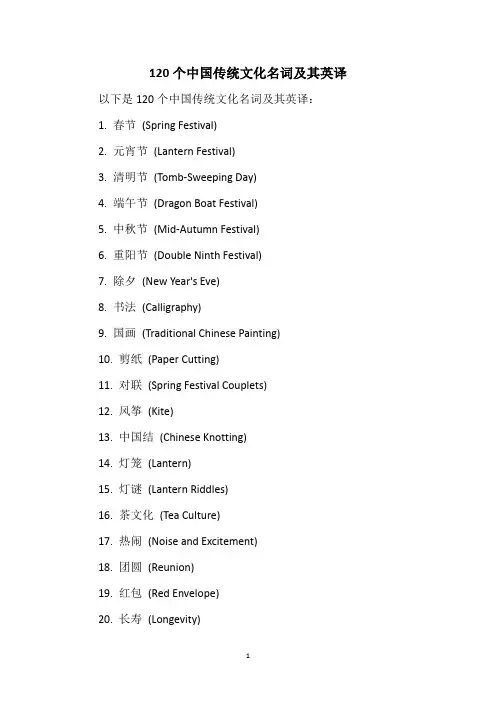
120个中国传统文化名词及其英译以下是120个中国传统文化名词及其英译:1. 春节(Spring Festival)2. 元宵节(Lantern Festival)3. 清明节(Tomb-Sweeping Day)4. 端午节(Dragon Boat Festival)5. 中秋节(Mid-Autumn Festival)6. 重阳节(Double Ninth Festival)7. 除夕(New Year's Eve)8. 书法(Calligraphy)9. 国画(Traditional Chinese Painting)10. 剪纸(Paper Cutting)11. 对联(Spring Festival Couplets)12. 风筝(Kite)13. 中国结(Chinese Knotting)14. 灯笼(Lantern)15. 灯谜(Lantern Riddles)16. 茶文化(Tea Culture)17. 热闹(Noise and Excitement)18. 团圆(Reunion)19. 红包(Red Envelope)20. 长寿(Longevity)21. 福字(Fu Character)22. 禅宗(Zen Buddhism)23. 道教(Taoism)24. 佛教(Buddhism)25. 儒家(Confucianism)26. 旗袍(Qipao)27. 长衫(Long Shirt)28. 唱戏(Opera)29. 京剧(Peking Opera)30. 象棋(Chinese Chess)31. 麻将(Mahjong)32. 瓜子(Sunflower Seeds)33. 腊八节(Laba Festival)34. 元宵(Tangyuan)35. 饺子(Dumplings)36. 年糕(Nian Gao)37. 火锅(Hot Pot)38. 炸酱面(Noodles with Soybean Paste)39. 午餐肉(Luncheon Meat)40. 豆腐(Tofu)41. 麻婆豆腐(Mapo Tofu)42. 宫保鸡丁(Kung Pao Chicken)43. 鱼香肉丝(Fish-Flavored Shredded Pork)44. 红烧肉(Braised Pork Belly)45. 糖葫芦(Candied Fruit on a Stick)46. 美食(Delicacy)47. 食文化(Food Culture)48. 酒文化(Wine Culture)49. 茅台酒(Maotai)50. 龙井茶(Longjing Tea)51. 碧螺春(Biluochun Tea)52. 普洱茶(Pu'er Tea)53. 茶道(Tea Ceremony)54. 茶艺(Tea Art)55. 书法(Calligraphy)56. 绘画(Painting)57. 雕塑(Sculpture)58. 陶艺(Pottery)59. 瓷器(Porcelain)60. 纺织(Textile)61. 刺绣(Embroidery)62. 缝纫(Sewing)63. 针灸(Acupuncture)64. 中药(Traditional Chinese Medicine)65. 草药(Herbal Medicine)66. 风水(Fengshui)67. 堪舆(Kanyu)68. 儒家经典(Confucian Classics)69. 四书五经(Four Books and Five Classics)70. 《大学》(The Great Learning)71. 《中庸》(The Doctrine of the Mean)72. 《论语》(The Analects of Confucius)73. 《孟子》(The Mencius)74. 《诗经》(The Book of Songs)75. 《尚书》(The Book of Documents)76. 《礼记》(The Book of Rites)77. 《易经》(The Book of Changes)78. 《春秋》(The Spring and Autumn Annals)79. 《孝经》(The Book of Filial Piety)80. 《尔雅》(The Book of Erya)81. 儒家思想(Confucian Thought)82. 道家思想(Taoist Thought)83. 佛教思想(Buddhist Thought)84. 法家思想(Legalist Thought)85. 墨家思想(Mohist Thought)86. 阴阳五行(Yin and Yang, Five Elements)87. 八卦(Eight Trigrams)88. 易经(I Ching)89. 太极(Tai Chi)90. 武术(Wushu)91. 少林寺(Shaolin Temple)92. 武当山(Wudang Mountains)93. 内功(Neigong)94. 外功(Waijong)95. 拳法(Boxing)96. 剑法(Swordplay)97. 气功(Qigong)98. 八段锦(Baduanjin)99. 五禽戏(Wuqinxi)100. 二十四节气(Twenty-Four Solar Terms)101. 农历(Lunar Calendar)102. 阳历(Solar Calendar)103. 天干地支(Heavenly Stems and Earthly Branches) 104. 黄道吉日(Good Fortune Days)105. 红事(Weddings)106. 白事(Funerals)107. 喜帖(Wedding Invitation)108. 聘礼(Betrothal Gift)109. 六礼(Six Ceremonies)110. 三书六礼(Three Books and Six Ceremonies)111. 红娘(Matchmaker)112. 月老(Old Man Under the Moon)113. 金榜题名(Golden List)114. 状元(Number One Scholar)115. 进士(Jinshi)116. 举人(Juren)117. 秀才(Xiucai)118. 科举(Imperial Examination)119. 四书(Four Books)120. 五经(Five Classics)这些名词涵盖了中国的传统文化、哲学思想、宗教信仰、节日庆典、文学艺术、饮食习惯、服饰风格、武术健身、天文历法等多个方面,反映了中国悠久的历史和丰富的文化内涵。
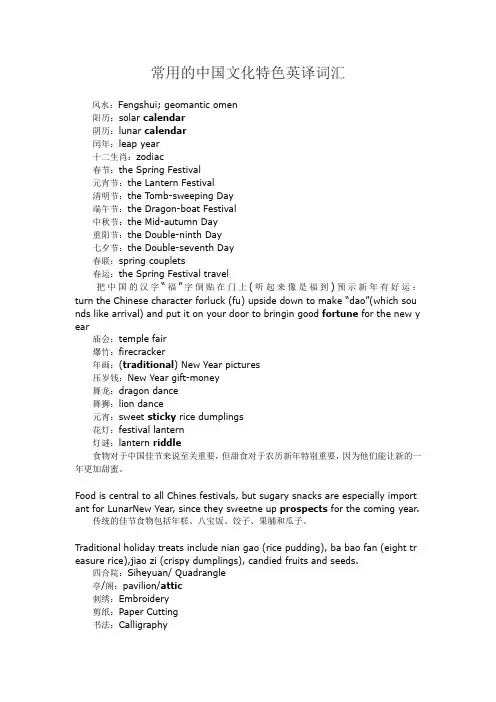
常用的中国文化特色英译词汇风水:Fengshui; geomantic omen阳历:solar calendar阴历:lunar calendar闰年:leap year十二生肖:zodiac春节:the Spring Festival元宵节:the Lantern Festival清明节:the Tomb-sweeping Day端午节:the Dragon-boat Festival中秋节:the Mid-autumn Day重阳节:the Double-ninth Day七夕节:the Double-seventh Day春联:spring couplets春运:the Spring Festival travel把中国的汉字“福”字倒贴在门上(听起来像是福到)预示新年有好运:turn the Chinese character forluck (fu) upside down to make “dao”(which sou nds like arrival) and put it on your door to bringin good fortune for the new y ear庙会:temple fair爆竹:firecracker年画:(traditional) New Year pictures压岁钱:New Year gift-money舞龙:dragon dance舞狮:lion dance元宵:sweet sticky rice dumplings花灯:festival lantern灯谜:lantern riddle食物对于中国佳节来说至关重要,但甜食对于农历新年特别重要,因为他们能让新的一年更加甜蜜。
Food is central to all Chines festivals, but sugary snacks are especially import ant for LunarNew Year, since they sweetne up prospects for the coming year.传统的佳节食物包括年糕、八宝饭、饺子、果脯和瓜子。
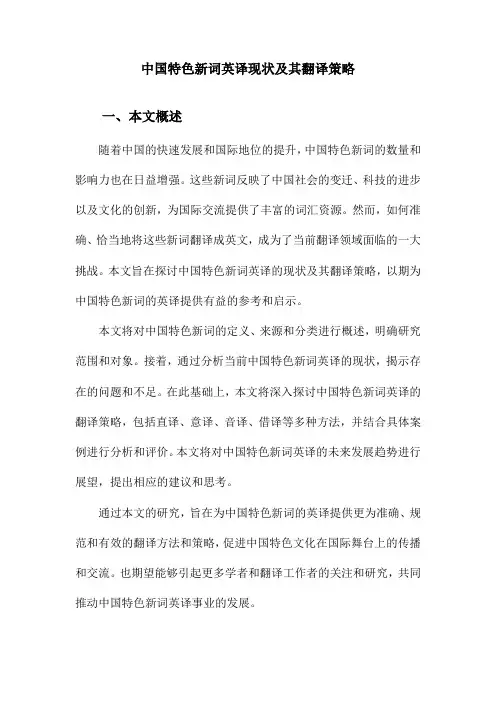
中国特色新词英译现状及其翻译策略一、本文概述随着中国的快速发展和国际地位的提升,中国特色新词的数量和影响力也在日益增强。
这些新词反映了中国社会的变迁、科技的进步以及文化的创新,为国际交流提供了丰富的词汇资源。
然而,如何准确、恰当地将这些新词翻译成英文,成为了当前翻译领域面临的一大挑战。
本文旨在探讨中国特色新词英译的现状及其翻译策略,以期为中国特色新词的英译提供有益的参考和启示。
本文将对中国特色新词的定义、来源和分类进行概述,明确研究范围和对象。
接着,通过分析当前中国特色新词英译的现状,揭示存在的问题和不足。
在此基础上,本文将深入探讨中国特色新词英译的翻译策略,包括直译、意译、音译、借译等多种方法,并结合具体案例进行分析和评价。
本文将对中国特色新词英译的未来发展趋势进行展望,提出相应的建议和思考。
通过本文的研究,旨在为中国特色新词的英译提供更为准确、规范和有效的翻译方法和策略,促进中国特色文化在国际舞台上的传播和交流。
也期望能够引起更多学者和翻译工作者的关注和研究,共同推动中国特色新词英译事业的发展。
二、中国特色新词的概念及分类中国特色新词,顾名思义,指的是那些具有中国文化特色、反映中国社会、经济、科技发展以及人民日常生活变化的新词汇。
这些词汇通常源于汉语的创新词汇、外来语的音译或意译、以及网络流行语等。
这些新词不仅反映了中国社会的快速发展和变迁,也丰富了汉语的词汇库,为语言的发展注入了新的活力。
创新词汇:这类词汇是基于汉语自身的构词规则和语义演变而产生的。
例如,“互联网+”“一带一路”“供给侧改革”等,这些词汇都是基于中国特有的政策、经济或社会现象而产生的。
外来语音译:随着中国与世界的交流日益频繁,许多外来词汇被引入汉语,并通过音译的方式转化为中文词汇。
例如,“咖啡”(coffee)、“披萨”(pizza)、“迪斯科”(disco)等。
外来语意译:除了音译外,许多外来词汇也被直接意译为中文,以保持其原有的含义。
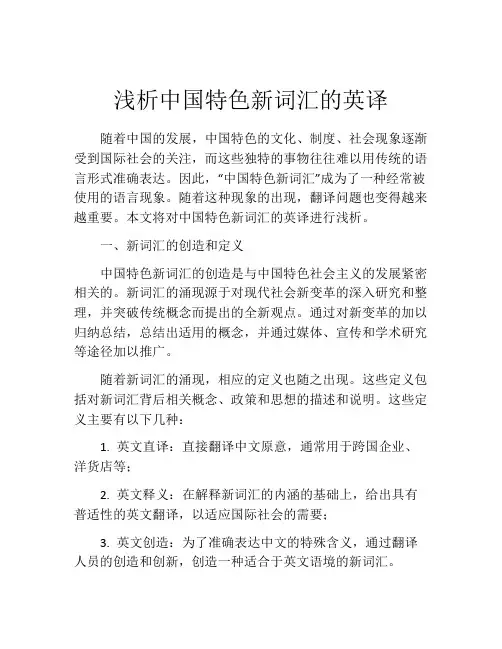
浅析中国特色新词汇的英译随着中国的发展,中国特色的文化、制度、社会现象逐渐受到国际社会的关注,而这些独特的事物往往难以用传统的语言形式准确表达。
因此,“中国特色新词汇”成为了一种经常被使用的语言现象。
随着这种现象的出现,翻译问题也变得越来越重要。
本文将对中国特色新词汇的英译进行浅析。
一、新词汇的创造和定义中国特色新词汇的创造是与中国特色社会主义的发展紧密相关的。
新词汇的涌现源于对现代社会新变革的深入研究和整理,并突破传统概念而提出的全新观点。
通过对新变革的加以归纳总结,总结出适用的概念,并通过媒体、宣传和学术研究等途径加以推广。
随着新词汇的涌现,相应的定义也随之出现。
这些定义包括对新词汇背后相关概念、政策和思想的描述和说明。
这些定义主要有以下几种:1. 英文直译:直接翻译中文原意,通常用于跨国企业、洋货店等;2. 英文释义:在解释新词汇的内涵的基础上,给出具有普适性的英文翻译,以适应国际社会的需要;3. 英文创造:为了准确表达中文的特殊含义,通过翻译人员的创造和创新,创造一种适合于英文语境的新词汇。
二、英语翻译中遇到的问题中国特色新词汇翻译的困难在于其在中文中独特的语言特点。
这些特点包括形成的文化背景、习惯用语、文化隐喻、民族特色等等。
由于以往在中国的翻译过程中大量依赖字面翻译,导致出现翻译不准,甚至出现歧义的情况。
因此,中国特色新词汇的翻译需要针对不同的背景和内涵,考虑英语语境下的确切含义,并使用适当的语言形式来表达。
1. 音译的困难中国特色新词汇中经常出现的音译问题,往往会给英语翻译带来不少的困难。
特别是在涉及到人名、地名、口音或行业中术语的时候,需要翻译者特别注意。
在音译中,翻译人员要尽可能地保留原词的音韵和节奏,使其有助于读者的理解和记忆。
2. 习惯用语和文化隐喻中国特色新词汇中还存在大量与文化相关的习惯用语和隐喻。
这些只有了解中国文化和传统习惯的人才能真正理解,而对于外国人而言,往往需要进行解释。
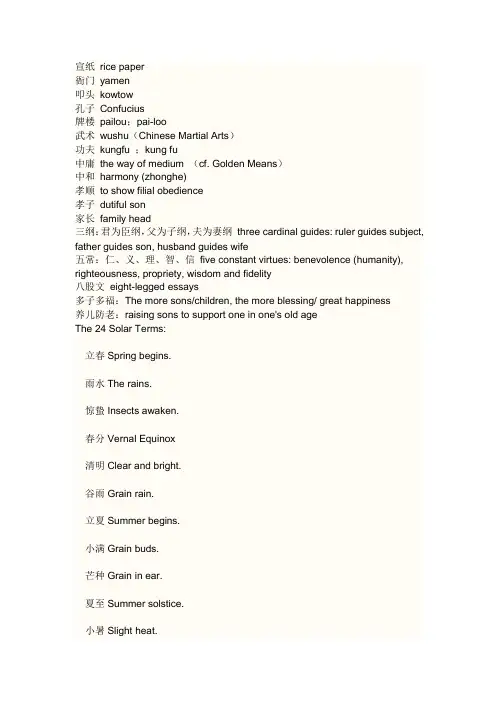
宣纸rice paper衙门yamen叩头kowtow孔子Confucius牌楼pailou;pai-loo武术wushu(Chinese Martial Arts)功夫kungfu ;kung fu中庸the way of medium (cf. Golden Means)中和harmony (zhonghe)孝顺to show filial obedience孝子dutiful son家长family head三纲:君为臣纲,父为子纲,夫为妻纲three cardinal guides: ruler guides subject, father guides son, husband guides wife五常:仁、义、理、智、信five constant virtues: benevolence (humanity), righteousness, propriety, wisdom and fidelity八股文eight-legged essays多子多福:The more sons/children, the more blessing/ great happiness养儿防老:raising sons to support one in one's old ageThe 24 Solar Terms:立春Spring begins.雨水The rains.惊蛰Insects awaken.春分Vernal Equinox清明Clear and bright.谷雨Grain rain.立夏Summer begins.小满Grain buds.芒种Grain in ear.夏至Summer solstice.小暑Slight heat.大暑Great heat.立秋Autumn begins.处暑Stopping the heat.白露White dews.秋分Autumn Equinox.寒露Cold dews.霜降Hoar-frost falls.立冬Winter begins.小雪Light snow.大雪Heavy snow.冬至Winter Solstice.小寒Slight cold.大寒Great cold戏剧表演Theatrical Performances京剧人物脸谱types of facial makeup in Beijing opera 生male characters末middle-aged male characters净“painted face” characters旦female characters丑clown京剧票友amateur performer of Peking Opera木偶戏puppet show独角戏monodrama; one-man play皮影戏shadow play; leather-silhouette show折子戏opera highlights戏剧小品skit哑剧dumb show; mime; mummery; pantomime单口相声monologue comic talk双口相声witty dialogue口技vocal imitations; ventriloquisim说书monologue story-telling杂技acrobatic performance叠罗汉making a human pyramid特技stunt踩高跷stilt walk马戏circus performances神化人物Mythological Figures八仙the Eight Immortals嫦娥Chang’e (the Chinese moon godd ess)伏羲Fu Xi (God of Fishery and Husbandry)福禄寿三星the three gods of fortune, prosperity and longevity共工God of Water后羿Houyi (a legendary hero who shot down nine suns)黄帝Yellow Emperor夸父Kuafu (a fabled sun-chasing giant)女娲Goddess of Sky-patching盘古Pan Gu (creator of the universe)神农Patron of Agriculture禹Yu (the reputed founder of the Xia Dynasty)祝融God of Fire古代建筑Ancient Architecture塔pagoda琉璃塔glazed stupa舍利塔dagoba; sarira stupa (a pagoda for Buddhist relics)舍利子sarira remains from cremation of Buddha’s or saints’ body 喇嘛塔Lamaist pagoda楼storied buildings钟楼bell tower鼓楼drum tower阁pavilion烽火台beacon tower华表ornamental column牌坊memorial archway艺术及工艺Arts and Crafts版画engraving贝雕画shell carving picture彩塑painted sculpture瓷器porcelain; china刺绣embroidery雕刻carving宫灯palace lantern国画Chinese painting剪纸paper-cut景德镇瓷Jingdezhen porcelain景泰蓝cloisonné enamel蜡染batik麦秸画straw patchwork木/石/竹刻wood/stone/bamboo carving木刻画wood engraving泥人儿clay figure皮影shadow puppet漆画lacquer painting漆器lacquerware双面绣two-sided embroidery水墨画Chinese brush drawing; ink and wash painting檀香扇sandalwood fan唐三彩Tang tri-coloured pottery陶器pottery; earthenware图章seal拓碑making rubbings from inscriptions, pictures, etc. on stone tablets 拓片rubbing微雕miniature engraving象牙雕刻ivory carving宜兴陶Yixing pottery篆刻sealcutting中国特色词汇及其英译作者:未知文章来源:转载点击数:1300 时间:2010-12-29 18:33:50一、前言英语从它传入中国的第一天开始就发挥着强大的交流作用,同时也开始了在中国发展的过程。
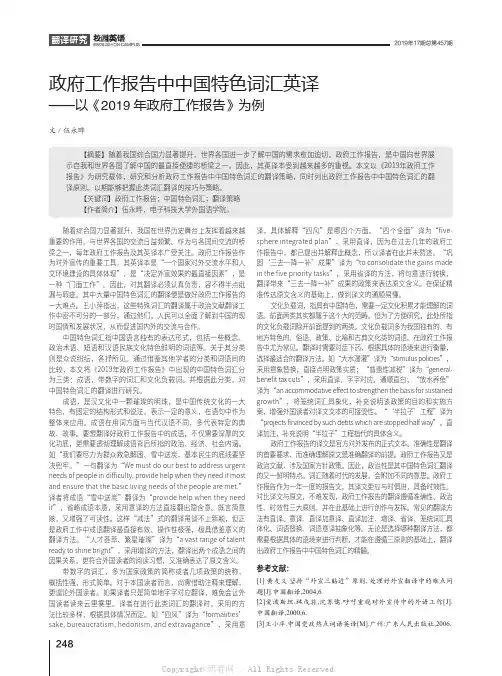
2482019年17期总第457期ENGLISH ON CAMPUS政府工作报告中中国特色词汇英译——以《2019年政府工作报告》为例文/伍永晔随着综合国力显著提升,我国在世界历史舞台上发挥着越来越重要的作用,与世界各国的交流日益频繁。
作为与各国间交流的桥梁之一,每年政府工作报告及其英译本广受关注。
政府工作报告作为对外宣传的重要工具,其英译本是“一个国家对外交流水平和人文环境建设的具体体现”,是“决定外宣效果的最直接因素”,是一种“门面工作”。
因此,对其翻译必须认真负责,容不得半点纰漏与瑕疵。
其中大量中国特色词汇的翻译便是做好政府工作报告的一大难点。
王小萍指出,这些特殊词汇的翻译属于政治文献翻译工作中密不可分的一部分,通过他们,人民可以全面了解到中国的现时国情和发展状况,从而促进国内外的交流与合作。
中国特色词汇指中国语言独有的表达形式,包括一些概念、政治术语、短语和汉语民族文化特色鲜明的词语等。
关于其分类则是众说纷纭,各抒所见。
通过借鉴其他学者的分类和词语间的比较,本文将《2019年政府工作报告》中出现的中国特色词汇分为三类:成语,带数字的词汇和文化负载词。
并根据此分类,对中国特色词汇的翻译进行研究。
成语,是汉文化中一颗璀璨的明珠,是中国传统文化的一大特色,有固定的结构形式和说法,表示一定的意义,在语句中作为整体来应用。
成语在用词方面与当代汉语不同,多代表特定的典故、故事。
要想翻译好政府工作报告中的成语,不仅需要深厚的文化功底,更需要透彻理解成语背后所指的政治、经济、社会内涵。
如“我们要尽力为群众救急解困、雪中送炭,基本民生的底线要坚决兜牢。
”一句翻译为“We must do our best to address urgent needs of people in difficulty, provide help when they need it most and ensure that the basic living needs of the people are met.”译者将成语“雪中送炭”翻译为“provide help when they need it”,省略成语本意,采用意译的方法直接翻出隐含意。
中国历史文化常用词汇英译Confucianism 儒教/儒家思想Taoism 道教Buddhism佛教temple寺庙Confucius孔子Mencius孟子Lao Tzu 老子ethics伦理学morality 道德benevolence 仁spiritual 精神的harmony 和谐The Analects of Confucius《论语》The Art of War《孙子兵法》Historical Records《史记》Historical Records《史记》zodiac十二生肖feudal封建的dynasty 朝代emperor;monarch皇帝,君主rein 统治royal 皇家的Tang Princess Wencheng 文成公主Empress Dowager Ci Xi慈禧太后prime minister丞相,宰相ethnic minority少数民族offer sacrifices 祭祀the Western Regions西域cradle of civilization文明的摇篮the Reform Movement of 1898 戌戌变法the Opium War 鸦片战争the War of Resistance Against Japan抗日战争Lunar calendar阴历Fengshui;geomantic omen风水calligraphy书法copybook 字帖Chinese character 汉字pictographic characters象形文字Mandarin (中国)普通话dialect 方言Chinese traditional painting 国画ink-wash painting 水墨画landscape painting 山水画mount裱scroll卷轴figure人物pavilion 阁,亭writing brush 毛笔ink 墨Xuan paper宣纸ink stone 砚台 A Riverside Scene at Qingming Festival清明上河图mural painting 壁画clay figure泥人folk art 民间艺术craftsman 工匠Beijing Opera 京剧facial make-up 脸谱costume 服装acrobatics杂技cross-talk 相声clapper talk快板storytelling评书Xiaopin小品Puppet show木偶剧shadow play 皮影戏zither古筝Tai Chi太极the four great inventions of ancient China 中国古代四大发明the Silk Road丝绸之路compass 指南针papermaking 造纸术gunpowder火药printing 印刷术movable type printing活字印刷fleet 舰队voyage航海traditional Chinese medicine 中药acupuncture 针灸medical massage推拿herbal medicine草药abacus 算盘bronze ware 青铜器porcelain 瓷器seismograph 地动仪Go 围棋martial arts (Wushu)武术fireworks 烟花firecracker鞭炮statutory holiday 法定假日Spring Festival 春节The Spring Festival Gala on CCTV春节联欢晚会gift of money wrapped in red paper 红包New Year gift-money压岁钱family reunion 团圆Lantern Festival元宵节Dragon Boat Festival 端午节sticky rice dumplings粽子Mid-autumn Festival 中秋节moon cake 月饼the Double Seventh Festival 七夕Spring Festival couplets 对联temple fair庙会festival lantern花灯lantern riddle灯谜God of Wealth 财神dumpling 饺子dragon boat race 龙舟赛dragon and lion dance 狮子龙灯舞stilt walking踩高跷dragon boat race赛龙舟kite flying 放风筝Yangge dance 秧歌舞Chinese cuisine中国菜color色aroma香taste , flavor 味chopsticks 筷子Sichuan cuisine川菜soybean milk 豆浆deep-fried dough sticks油条steamed buns 馒头steamed twisted rolls花卷steamed stuffed buns包子Beijing roast duck北京烤鸭hand-stretched noodles拉面hot pot火锅tofu 豆腐instant noodles 方便面wood-cut block print 木刻版画papercutting, paper-cuts 剪纸Chinese Spring Festival Paintings年画cloisonne 景泰蓝embroidery刺绣Suzhou embroidery苏绣batik 蜡染pattern 图案decorate v. 装饰decoration n. 装饰Chinese tunic suit 中山装cheongsam (qipao ) 旗袍Tang-style costume 唐装feature 特色unique to China 中国特有的characteristic 特点the Imperial Palace故宫the Forbidden City 紫禁城Beijing quadrangles北京四合院hutong胡同the Temple of Heaven 天坛The Summer Palace颐和园the Great Wall 长城drum tower鼓楼the Terra-cotta Army of the First Emperor of Qin兵马俑the Mausoleum of Emperor Huangdi黄帝陵scenery, landscape 风景place of interests名胜tourist attraction/resort 观光胜地sightsee v. 观光,游览Mount Huangshan 黄山the Jiuzhaigou Valley 九寨沟the Mogao Caves 莫高窟giant panda 大熊猫rare 珍稀的bamboo竹子。
中国特色词汇英语翻译第一部分:1. 元宵节:Lantern Festival2. 刺绣:embroidery3. 重阳节:Double-Ninth Festival4. 清明节:Tomb sweeping day5. 剪纸:Paper Cutting6. 书法:Calligraphy7. 对联:(Spring Festival) Couplets8. 象形文字:Pictograms/Pictographic Characters9. 人才流动:Brain Drain/Brain Flow10. 四合院:Siheyuan/Quadrangle11. 战国:Warring States12. 风水:Fengshui/Geomantic Omen13. 铁饭碗:Iron Bowl14. 函授部:The Correspondence Department15. 集体舞:Group Dance16. 黄土高原:Loess Plateau17. 红白喜事:Weddings and Funerals18. 中秋节:Mid-Autumn Day19. 结婚证:Marriage Certificate20. 儒家文化:Confucian Culture21. 附属学校:Affiliated school22. 古装片:Costume Drama23. 武打片:Chinese Swordplay Movie24. 元宵:Tangyuan/Sweet Rice Dumpling25. 一国两制:One Country, Two Systems26. 火锅:Hot Pot27. 四人帮:Gang of Four28. 《诗经》:The Book of Songs29. 素质教育:Essential-qualities-oriented Education30. 《史记》:Historical Records/Records of the Grand Historian31. 大跃进:Great Leap Forward (Movement)32. 《西游记》:The Journey to the West33. 除夕:Chinese New Year’s Eve/Eve of the Spring Festival34. 针灸:Acupuncture35. 唐三彩:Tri-color Pottery of the Tang Dynasty/ The Tang Tri-colored pottery36. 中国特色的社会主义:Chinese-charactered Socialist/Socialist with Chinese characteristics37. 偏旁:radical38. 孟子:Mencius39. 亭/阁:Pavilion/ Attic40. 大中型国有企业:Large and Medium-sized State-owned Enterprises41. 火药:gunpowder42. 农历:Lunar Calendar43. 印/玺:Seal/Stamp44. 物质精神文明建设:The Construction of Material Civilization and Spiritual Civilization45. 京剧:Beijing Opera/Peking Opera46. 秦腔:Crying of Qin People/Qin Opera47. 太极拳:Tai Chi48. 独生子女证:The Certificate of One-child49. 天坛:Altar of Heaven in Beijing50. 小吃摊:Snack Bar/Snack Stand51. 红双喜:Double Happiness52. 政治辅导员:Political Counselor/School Counselor53. 春卷:Spring Roll(s)54. 莲藕:Lotus Root55. 追星族:Star Struck56. 故宫博物院:The Palace Museum57. 相声:Cross-talk/Comic Dialogue58. 下岗:Lay off/Laid off59. 北京烤鸭:Beijing Roast Duck60. 高等自学考试:Self-taught Examination of Higher Education61. 烟花爆竹:fireworks and firecracker62. 敦煌莫高窟:Mogao Caves63. 电视小品:TV Sketch/TV Skit64. 香港澳门同胞:Compatriots from Hong Kong and Macao65. 文化大革命:Cultural Revolution66. 长江中下游地区:The Mid-low Reaches of Yangtze River67. 门当户对:Perfect Match/Exact Match68. 《水浒》:Water Margin/Outlaws of the Marsh69. 中外合资企业:Joint Ventures70. 文房四宝(笔墨纸砚):"The Four Treasure of the Study" "Brush, Inkstick, Paper, and Inkstone"第二部分中国意念词(Chinesenesses)八卦trigram阴、阳yin, yang道Dao(cf. logo)江湖(世界)the jianghu World (the traits’world)e.g. You can’t control everything in a traits’world. (人在江湖,身不由己)道Daoism(Taoism)上火excessive internal heat儒学Confucianism红学(《红楼梦》研究)redology世外桃源Shangri-la or Arcadia开放kaifang (Chinese openness to the outside world)大锅饭getting an equal share regardless of the work done 伤痕文学scar literature or the literature of the wounded 不搞一刀切no imposing uniformity on …合乎国情,顺乎民意to conform with the national conditions and the will of the people乱摊派,乱收费imposition of arbitrary quotas and service charge铁交椅iron (lifetime) post’s; guaranteed leading post脱贫to shake off poverty; anti-poverty治则兴,乱则衰Order leads to prosperity and chaos to decline第三部分中华民族的喜庆节日(Chinese Festivial)国庆节National Day中秋节Mia-Autumn Festival春节Spring Festival元宵节Lantern Festival儿童节Children’s Day端午节Dragon Boat Festival妇女节Women’s Day泼水节Water-Splashing Day五四青年节Youth Day第四部分中国独特的传统饮食(Unique Traditional Chinese Foods)馄饨wonton花卷steamed twisted rolls套餐set meal盒饭box lunch; Chinese take-away米豆腐rice tofu魔芋豆腐konjak tofu米粉rice noodles冰糖葫芦a stick of sugar-coated haws (or apples,etc.) 粉丝glass noodles豆腐脑jellied bean curd第五部分中国新兴事物(Newly Sprouted Things)中国电信China Telecom中国移动China Mobile十五计划the 10th Five-Year Plan中国电脑联网Chinanet三峡工程the Three Gorges Project希望工程Project Hope京九铁路Beijing CKowloon Railway扶贫工程Anti-Poverty Project菜篮子工程Vegetable Basket Project温饱工程Decent-Life Project安居工程Economy Housing Project扫黄Porn-Purging Campaign西部大开发Go-West Campaign5 、特有的一些汉语词汇禅宗Zen Buddhism禅dhyana; dhgaya混沌chaos道Daosim, the way and its power四谛Four Noble Truth八正道Eightfold Path无常anity五行说Theory of Five Elements无我anatman坐禅metta or transcendental meditation空sunyata虚无nothingness双喜double happiness(中),a doubled stroke of luck(英) 小品witty skits相声cross-talk噱头;掉包袱gimmick, stunt夜猫子night people; night-owls本命年this animal year of sb.处世之道philosophy of life姻缘yinyuan(prefixed fate of marriage)还愿redeem a wish (vows)6 、具有文化特色的现代表述大陆中国Mainland China红色中国socialist China四化Four Modernizations终生职业job-for-life铁饭碗iron rice bowl大锅饭communal pot关系户closely-related units外出打工人员migrant workers关系网personal nets, closely-knitted guild五讲(讲文明、讲礼貌、讲卫生、讲秩序、讲道德):the Five Merits focus on decorum, manners, hygiene, disciplines and morals四美(心灵美、语言美、行为美、环境美):the Four Virtues are golden heart, refined language, civilized behavior, and green environment7 、中国古代独特事物(Unique Ancient Chinese Items)宣纸rice paper衙门yamen叩头kowtow孔子Confucius武术wushu(Chinese Martial Arts)功夫kungfu ;kung fu中庸the way of medium (cf. Golden Means)中和harmony (zhonghe)孝顺to show filial obedience孝子dutiful son家长family head三纲:君为臣纲,父为子纲,夫为妻纲three cardinal guides: ruler guides subject, father guides son husband guides wife五常:仁、义、理、智、信five constant virtues: benevolence (humanity), righteousness, propriety, wisdom and fidelity 八股文eight-legged essays多子多福:The more sons/children, the more blessing/ great happiness养儿防老:raising sons to support one in one’s old age 8、近一季度见诸报端的中国现代特色词汇翻译基层监督grass-roots supervision基础税率base tariff level婚介所matrimonial agency婚外恋extramarital love婚纱摄影bride photo黑心棉shoddy cotton机器阅卷machine scoring即开型奖券scratch-open ticket/lottery集中精力把经济建设搞上去go all out for economic development价格听证会public price hearings甲A球队Division A Soccer Team家政服务household management service加强舆论监督ensure the correct orientation is maintained in public opinion假帐accounting fraud叫板challenge; pick a quarrel矫情use lame arguments借调temporarily transfer渐进式台独gradual Taiwan independence扩大中等收入者比重Raise the proportion of themiddle-income group.扩大内需,刺激消费expand domestic demand and consumption安居工程housing project for low-income urban residents 智力密集型concentration of brain power; knowledge-intensive外资企业overseas-funded enterprises下岗职工laid-off workers分流reposition of redundant personnel三角债chain debts素质教育education for all-round development豆腐渣工程jerry-built projects社会治安情况law-and-order situation民族国家nation state“台独”"independence of Taiwan"台湾当局Taiwan authorities台湾同胞Taiwan compatriots台湾是中国领土不可分割的一部分。
中国古代常见专用词汇的英译参考书中国古代常见专用词汇的英译参考书导言:中国古代文化源远流长,其中蕴含着丰富的禅意、史诗般的故事、深奥的哲学思想等等。
为了更好地传承和传播这些宝贵的文化资源,在英译中国古代文献和著作时,我们需要一个全面、准确且有深度的参考书。
本文将为大家推荐一本此类参考书《中国古代常见专用词汇的英译》。
一、目录和大纲简介1. 引言1.1 古代文化与翻译的挑战1.2 介绍《中国古代常见专用词汇的英译》这本书2. 中国古代常见专用词汇的英译2.1 对古代专用词汇的定义和用途2.2 古代专用词汇的分类和特点2.2.1 宗教与哲学词汇2.2.2 文艺与文化词汇2.2.3 政治与社会词汇2.2.4 科学与技术词汇2.3 英译古代专用词汇的挑战2.3.1 语言差异与文化差异2.3.2 语义多样性与隐喻2.3.3 历史背景与社会语境2.4 《中国古代常见专用词汇的英译》的编写原则和方法 2.4.1 全面收录与分类整理2.4.2 关注语境与语义2.4.3 借鉴现代用词与文化补充2.4.4 建立示例与引用2.5 高质量的英译对古代专用词汇的重要性3. 《中国古代常见专用词汇的英译》的应用与实例3.1 文化交流与学术研究中的应用3.2 文学作品与译者的实际案例4. 结论与展望4.1 现有参考书的不足与改进4.2 未来发展方向与挑战二、内容展开1. 引言1.1 古代文化与翻译的挑战中国古代文化是世界上独一无二的文化遗产,具有深厚的历史和独特的特色。
在进行英译工作时,翻译人员需要面对许多挑战,如语言差异、文化差异以及在理解古代文本时的困难等。
1.2 介绍《中国古代常见专用词汇的英译》这本书《中国古代常见专用词汇的英译》是一本常见专用词汇的英译参考书,旨在帮助译者和读者更好地理解和翻译中国古代文献和著作。
本书综合了大量的资源和研究成果,并提供了详尽的解释和示例,以满足读者对中国古代文化的全面、深入和灵活理解的需求。
话语权视角下的中国特色词汇英译研究随着中国在国际舞台上的不断崛起,中国特色的词汇也逐渐被引入到国际社会中。
这些词汇往往承载了中国传统文化的独特内涵,反映了中国人在思想、文化和社会生活中的态度和情感。
这些词汇的英语翻译往往面临着词义的丰富性和文化差异的挑战。
本文将从话语权视角出发,探讨中国特色词汇的英语翻译问题,并寻求更合适的翻译方式。
一、中国特色词汇的话语权话语权是指在某一领域拥有话语主导权和控制权的能力。
在国际交流中,中国特色的词汇承载了丰富的文化内涵和历史背景,反映了中国人的价值观和思维方式。
这使得这些词汇在国际传播中具有独特的话语权,成为中国文化软实力的一部分。
“和谐”这个词在中国传统文化中承载了“家庭和谐”、“社会和谐”等深刻内涵,是中国人民追求的一种理想境界。
而在国际社会中,“和谐”则被认为是中国特色的一个重要象征,体现了中国人民对和平与发展的追求。
对于这样的词汇来说,它们的英语翻译不仅仅是语言文字的转换,更是文化内涵和思想观念的传递。
在中国特色词汇的英语翻译中,最突出的问题之一就是词义的丰富性。
中国特色的词汇往往蕴含了多重的文化内涵和情感意义,这使得其在英语翻译中很难找到一个恰当的词语来完整表达其含义。
“中华”一词在中国传统文化中代表了中华民族的整体形象和文化精神,而在国际社会中,却很难用一个词语来准确表达其所有的内涵。
中国特色词汇的英语翻译还面临着文化差异的挑战。
由于中西方的文化背景和思维方式存在较大差异,因此在英语翻译过程中很难做到完全忠实于原文的意义和情感。
“道”在中国传统文化中代表了一种生活态度和思维方式,而在西方文化中很难找到一个恰当的词语来准确翻译其内涵。
针对中国特色词汇的英语翻译问题,我们可以采用一些特定的翻译策略来提高翻译的准确性和质量。
可以采用“注释+译文”的方式进行翻译。
对于一些词义丰富、文化内涵深刻的中国特色词汇,可以在译文后附上相应的注释,以便读者更好地理解其含义和背景。
中国流行词语的英文表达1. 素质教育:Quality Education2. EQ:分两种,一种为教育商数Educational quotient,另一种情感商数Emotional quotient3. 保险业: the insurance industry4. 保证重点指出: ensure funding for priority areas5. 补发拖欠的养老金: clear up pension payments in arrears6. 不良贷款: non-perFORMing loan7. 层层转包和违法分包:mutlti-level contracting and illegal subcontracting8. 城乡信用社: credit cooperative in both urban and rural areas9. 城镇居民最低生活保障: a minimum standard of living for city residents10. 城镇职工医疗保障制度: the system of medical insurance for urban workers11. 出口信贷: export credit12. 贷款质量: loan quality13. 贷款质量五级分类办法: the five-category assets classification for bank loans14. 防范和化解金融风险: take precautions against and reduce financial risks15. 防洪工程: flood-prevention project16. 非法外汇交易: illegal foreign exchange transaction17. 非贸易收汇: foreign exchange earnings through nontrade channels18. 非银行金融机构: non-bank financial institutions19. 费改税: transFORM administrative fees into taxes20. 跟踪审计: foolow-up auditing21. 工程监理制度: the monitoring system for projects22. 国有资产安全: the safety of state-owned assets23. 过度开垦: excess reclamation24. 合同管理制度: the contract system for governing projects25. 积极的财政政策: pro-active fiscal policy26. 基本生活费: basic allowance27. 解除劳动关系: sever labor relation28. 金融监管责任制:the responsibility system for financial supervision29. 经济安全: economic security30. 靠扩大财政赤字搞建设: to increase the deficit to spend more on development31. 扩大国内需求: the expansion of domestic demand32. 拉动经济增长: fuel economic growth33. 粮食仓库: grain depot34. 粮食收购企业: grain collection and storage enterprise35. 粮食收购资金实行封闭运行: closed operation of grain purchase funds36. 粮食销售市场: grain sales market37. 劣质工程: shoddy engineering38. 乱收费、乱摊派、乱罚款: arbitrary charges, fund-raising, quotas and fines39. 骗汇、逃汇、套汇: obtain foreign currency under false pretenses, not turn over foreign owed to the government and illegal arbitrage40. 融资渠道: financing channels41. 商业信贷原则: the principles for commercial credit42. 社会保险机构: social security institution43. 失业保险金: unemployment insurance benefits44. 偷税、骗税、逃税、抗税: tax evasion, tax fraud and refusal to pay taxes45. 外汇收支: foreign exchange revenue and spending46. 安居工程: housing project for low-income urban residents47. 信息化: inFORMation-based; inFORMationization48. 智力密集型: concentration of brain power; knowledge-intensive49. 外资企业: overseas-funded enterprises50. 下岗职工: laid-off workers51. 分流: reposition of redundant personnel52. 素质教育: education for all-round development53. 豆腐渣工程: jerry-built projects54. 社会治安情况: law-and-order situation55. 民族国家: nation state56. “*”: "independence of Taiwan57. 台湾当局: Taiwan authorities58. 台湾同胞: Taiwan compatriots59. 台湾是中国领土不可分割的一部分:Taiwan is an inalienable part of the Chinese territory.60. 西部大开发: Development of the West Regions61. 可持续性发展: sustainable development62. 风险投资: risk investment63. 通货紧缩: deflation64. 扩大内需: to expand domestic demand65. 计算机辅助教学: computer-assisted instruction ( CAI )66. 网络空间: cyberspace67. 虚拟现实: virtual reality68. 网民: netizen ( net citizen )69. 电脑犯罪: computer crime70. 电子商务: the e-business71. 网上购物: shopping online72. 应试教育: exam-oriented education73. 学生减负: to reduce study load74. “厄尔尼诺”:(EL Nino)75. “拉尼娜”:(La Nina)76. “智商”:(IQ)77. “情商”:(EQ)78. “第三产业”:(third/tertiary industry,service sector,third sequenceof e nterprises)79.“第四产业”:(quaternary/inFORMation industry)79. “军嫂”:(military spouse)80. “峰会”(香港译“极峰会议”)”:summit(conference)81. “克隆”:clone82. “冰毒”:ice83. “摇头丸”:dancing outreach84. “传销”:multilevel marketing85. “(计算机)2000年问题”:Y2K problem(y for year, k for kilo or thousand)86. “白皮书”:white paper(不是white cover book)87. “傻瓜相机”:Instamatic(商标名,焦距、镜头均固定,被称为foolproof 相机);88. “白条”:IOU note(IOU:债款、债务,由I owe you 的读音缩略转义而来)89. “巡回招聘”:milk round(一种招聘毕业生的方式,大公司走访各大学及学院,向求职者介绍本公司情况并与报名者晤谈)。
90. “减员增效”:increase efficiency by downsizing staff;91. “抓大放小”:manage large enterprises well while ease control over small ones;92. “市政府要办的X件实事”:x major projects that should be given top priorit y as designated on the municipal government’s working agenda;93. “两个基本点”:two focal points,two of the major points of the line set by the 13th Congress of the CPC,I.e.upholding the four cardinal principles and the policies reFORM,opening to the outside world and invigorating domesticeconomy。
94. “投资热点”:a region attractive to investors,a muchsought piece of hand, popular investment spot95. “移动电话”:本系cellular(有时简作cel)或mobile(tele)phone96. “三角债”:chain debts或debt chains97. “拳头产品”:knockout product98. “投诉热线”:dial-a-cheat confidential hotline(打电话告诉一件欺诈事件)99. “三通”的现译文three links:link of trade,travel and post 100. “外资”:overseas investments101. “开放”:open to the outside world102. “联防”:community/teampolicing(一种由警察和辖区居民共同参与的治安管理)103. “三陪服务”:escort services(陪伴服务)。